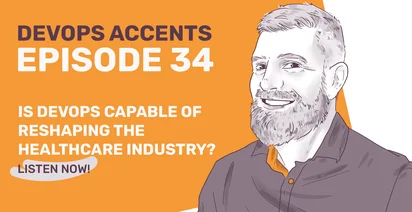Is DevOps capable of reshaping the healthcare industry? with Sergiej Soft from Caspar Health | 🎙️#34

What is the place of DevOps and Cloud in Health Tech, and what is the future of the Health Tech itself? What are the biggest challenges it faces and what could be the solutions? Sergiej Soft, Head of Tech at Caspar Health is here with us today to discuss the many perturbations of healthcare digitalization.
- Where do you draw the line defining DevOps?
- Health data in the age of cloud;
- What stops us from healthcare data standardization?
- How sensitive can healthcare data really be?
- Centralization vs. Decentralization: what is the way forward for Health Tech?
You can listen to episode 34 of DevOps Accents on Spotify, or right now:
In the realm of Health Tech, the potential for DevOps and artificial intelligence (AI) to drive innovation is immense. The discussion with Sergiej Soft sheds light on how these technologies are not just reshaping the digital infrastructure of healthcare but also paving the way for more personalized, efficient, and secure healthcare services.
The Role of DevOps in Health Tech
DevOps, a blend of development and operations, aims at unifying and automating processes. In healthcare, this translates into developing software solutions that can manage patient data, streamline operations, and ultimately enhance the quality of care. Sergiej emphasizes the importance of a collaborative environment where tech and healthcare professionals can work together seamlessly to innovate and address the specific needs of the health sector.
I think it's just that someone went too far at some point and started attaching “Ops” to any word. So you can see, like, vacancies for “BizOps”. And then it's really hard to understand what this case means. “Ops” is a new “job”. There are “business operations” that are completely unrelated to infrastructure and technology. But then there's also “BizOps” terms that have something to do with DevOps. It's confusing. — Kirill Shirinkin
AI's Transformative Potential in Healthcare
AI's role in Health Tech is groundbreaking. From predictive analytics that can foresee health issues before they become serious to automating routine tasks, AI is at the forefront of revolutionizing patient care. Sergiej highlighted AI can significantly reduce manual labor and improve accuracy in medical diagnostics and patient care.
The Digitalization Challenge in Healthcare
One of the biggest hurdles in the advancement of Health Tech is the digitalization of healthcare data. Sergiej points out the gap in data availability within the health sector, where vital information like blood types or previous medical examinations is often inaccessible or siloed within specific healthcare institutions. This lack of access and standardization significantly hampers the ability to provide personalized and timely healthcare.
If I try to quickly describe the landscape of data availability in health tech, it's non-existing. I'm doing this test when I'm doing customer discovery, I'm asking, “Do you know your blood type?” 10% of people might know that by chance because they were curious or, I don't know, something happened. But if you ask them, I don't know, when was the last time you were doing the X ray of your lungs, that we have to do at least once in life, no one knows where it's stored. No one knows where this data belongs. — Sergiej Soft
DevOps and AI as Solutions
The integration of DevOps practices and AI technologies offers a promising solution to these challenges. By leveraging DevOps for more agile and efficient development of healthcare solutions and employing AI for data analysis and predictive modeling, the health sector can achieve significant improvements. This includes better disease prevention, personalized treatment plans, and more efficient healthcare service delivery.
There is a transparency trust issue. — Sergiej Soft
Sergiej's Vision for the Future
Sergiej envisions a future where Health Tech embraces a user-centric approach, allowing patients to own and control their health data through digital means. This would enable not just better health management but also empower individuals with the knowledge and tools to take proactive steps towards their health and wellbeing. His call to action for DevOps engineers and tech enthusiasts is to engage and contribute to this transformative journey, making healthcare more accessible, efficient, and personalized.
It's a generally interesting topic. How much? How much are we willing to share, if this would give us some insights that are really meaningful? — Sergiej Soft
In Conclusion
There’s a case now here in Spain that is super famous. It’s a company, that makes eyeballs scans. So they go to universities, they go to many places with young people, and they say to them: we will pay you 2k, 3k, 10k, depends n the case, and nobody knows why. But they are doing that and they already made something like 30,000 or 40,000 scans of people. And they have all this data. And then the problem is… imagine in five years that this is the key to open the door of your house. Imagine that. We are moving to an area where in the end it is sensitive data for these people. And they are selling the data because they don't know yet why this data is so important. — Pablo Inigo Sanchez
The discussion with Sergiej Soft illuminates the potential of DevOps and AI in advancing Health Tech. By tackling the digitalization challenges and harnessing the power of these technologies, the health sector can move towards a more integrated, efficient, and patient-centric model. This evolution promises not only to enhance the quality of care but also to make healthcare more accessible and tailored to individual needs, marking a significant leap forward in the journey towards digital transformation in healthcare.
Our guest, Sergiej Soft:
- Learn more about what Sergiej does professionally.
- Connect with Sergiej on Linkedin.
- Subscribe to his personal podcast where he discusses business and AI with tech leaders.
- Don't miss the episode with Kirill (co-founder of mkdev) for a deeper dive into cloud evolution.
Podcast editing: Mila Jones / milajonesproduction@gmail.com
